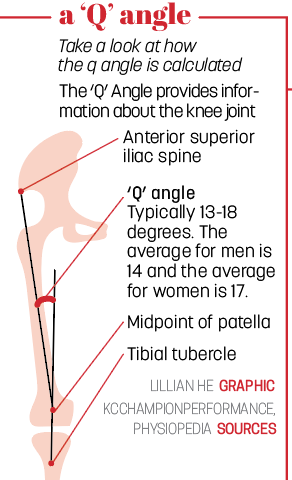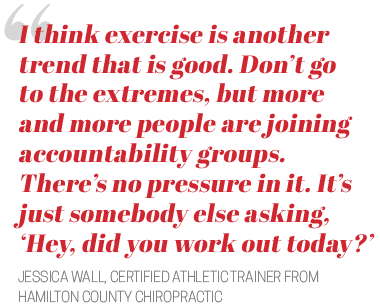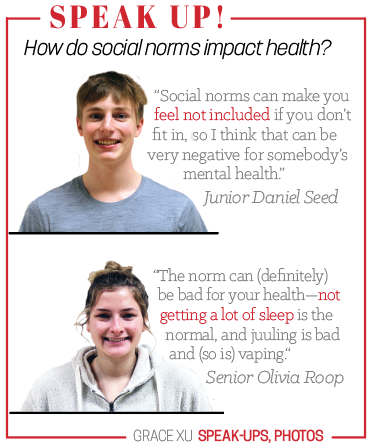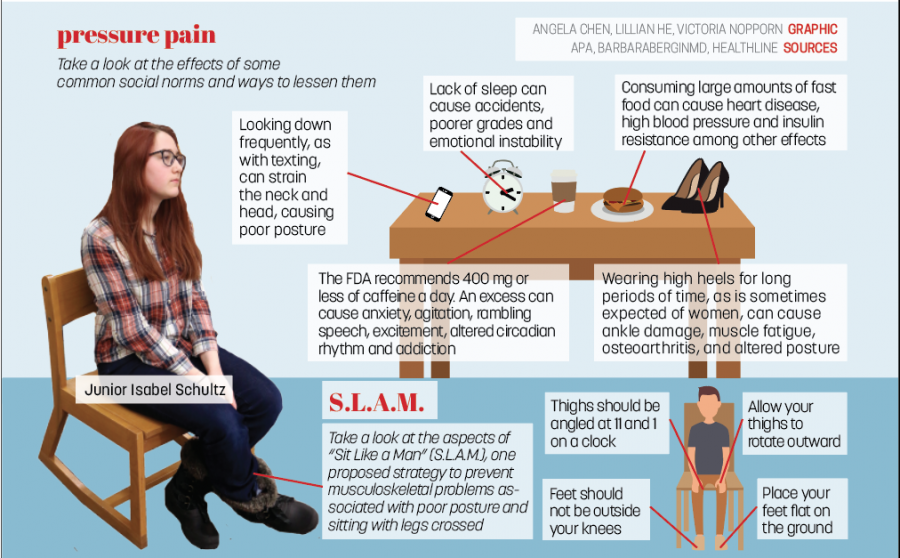Junior Isabel Schultz can’t sit for prolonged periods—nor can she stand for extended amounts of time—without feeling intense pain. As someone with chronic back pain paired with scoliosis, she not only has to wear a back brace, but she said she even had to quit a recent job because of the number of hours she had to work continually standing.
 While Schultz said genetics likely plays a major role in her back pain given her family’s medical history, she added that many of her daily life habits, such as posture, likely contribute as well. However, societal norms may actually be encouraging such unhealthy habits like bad posture in many cases. In fact, a health trend encouraging women to “S.L.A.M.,” or “Sit Like A Man,” has recently resurfaced as a result of research implicating that social norms—specifically of women sitting cross-legged—may be causing the higher rates of joint pain in females compared to males.
While Schultz said genetics likely plays a major role in her back pain given her family’s medical history, she added that many of her daily life habits, such as posture, likely contribute as well. However, societal norms may actually be encouraging such unhealthy habits like bad posture in many cases. In fact, a health trend encouraging women to “S.L.A.M.,” or “Sit Like A Man,” has recently resurfaced as a result of research implicating that social norms—specifically of women sitting cross-legged—may be causing the higher rates of joint pain in females compared to males.
While Schultz said she wasn’t personally aware of this phenomenon, she said such social norms likely did create a difference in posture for some.
“I have never thought about it like that, but that actually would make so much sense,” Schultz said. “When a man is ‘manspreading’ and they’re sitting out and trying to take up as much space as possible, it’s like you naturally need to be sitting up straight to look all tough and big.”
According to Jessica Wall, certified athletic trainer from Hamilton Country Chiropractic, the theory that sitting cross-legged is a cause of joint pain in women does have a foundation in anatomy. However, she said it might not be the principal cause of joint pain in females.
 “Being a woman, your hip is also wider, which really affects everything lower. That’s why you see, a lot of times, women tear an ACL (a knee ligament) more. It’s because their hips are wider and their knees go in,” Wall said. “(As a woman), you’ll have a larger ‘Q angle’ and that affects your knees, which in turn affects your ankles and how you stand and how you land and everything else… But there’s so many other factors that also play into back, hip, knee and ankle pain in women.”
“Being a woman, your hip is also wider, which really affects everything lower. That’s why you see, a lot of times, women tear an ACL (a knee ligament) more. It’s because their hips are wider and their knees go in,” Wall said. “(As a woman), you’ll have a larger ‘Q angle’ and that affects your knees, which in turn affects your ankles and how you stand and how you land and everything else… But there’s so many other factors that also play into back, hip, knee and ankle pain in women.”
For instance, sophomore Rachel King has Ehlers-Danlos syndrome, a disorder that can cause constant joint dislocations and back pain. According to Healthline, the disorder is entirely genetic and usually inherited. King said she has mixed feelings knowing that, unlike some other forms of back pain, her own was not the result of her actions or other environmental factors.
“(Having Ehlers-Danlos) kind of sucks, but also it kind of makes me feel better knowing that I didn’t really do anything to cause it. I just have it,” King said. “I feel like I would blame myself for it more (if it wasn’t genetic), but I feel like I’m able to not think about it as much because I didn’t specifically (cause the disease).”
Schultz said while she doesn’t necessarily blame her back pain solely on her actions either, she believes her actions have impacted her health. She also added that many actions—such as increased phone usage—are encouraged through societal norms despite possible health detriments.
 “We all know that being on your phone all the time makes your neck hurt, and your eyes are weaker, and your back usually gets worse as well,” Schultz said. “I’m guilty of (being on my phone) too. I’m on my phone a lot. But the way that phones have become so integral in our society—it’s really hard to function without one. And if your focus is all on your phone or even mostly on your phone, you’re not going to be thinking about sitting up straight and having good posture and how you should lift up your head or whatever so your neck doesn’t hurt.”
“We all know that being on your phone all the time makes your neck hurt, and your eyes are weaker, and your back usually gets worse as well,” Schultz said. “I’m guilty of (being on my phone) too. I’m on my phone a lot. But the way that phones have become so integral in our society—it’s really hard to function without one. And if your focus is all on your phone or even mostly on your phone, you’re not going to be thinking about sitting up straight and having good posture and how you should lift up your head or whatever so your neck doesn’t hurt.”

King elaborated on the impacts of social norms and environmental surroundings as well, acknowledging that they may affect health not just physically, but also mentally.
“Social norms can cause a lot of mental issues which then impact everything. Even eating disorders, those are really physically and mentally harmful because of social norms,” King said. “There’s just a lot of harmful things that social norms do for health—like you could change your physical appearance to better fit in with social norms. Being on your phone all the time could impact your back pain or even us sitting all the time in school can negatively impact our backs, especially because a lot of people are still growing.”
Wall said she agrees on the negative impacts of social norms, citing vaping and extreme diets, such as the zero-calorie diet, as examples of social trends normalizing unhealthy behaviors. However, she also added that such social trends can have positive effects in addition to the negative ones.
“I think there is some good to having diets in the spotlight because it shows people how you can eat. There are some great ones, like the Mediterranean diet,” Wall said. “I think exercise is another trend that is good. Don’t go to the extremes, but more and more people are joining accountability groups where there’s a bunch of people who are holding others accountable. There’s no pressure in it. It’s just somebody else asking, ‘Hey, did you work out today?’ or ‘Hey, do you want to go for a run today?’”
Wall also said while the causes of health issues are numerous and diverse—from genetics to social norms to daily habits—it is always important to take care of basic health needs and try to address issues as soon as possible.
“Everything’s about balance. Nutrition is huge. Exercise is huge. Sleeping (is huge),” Wall said. “I think that preventative medicine is also important. Even if you’re not hurting, go get checked out… You have to take care of your body because it’s the only one that you have.”
Read further about scoliosis here

































![AI in films like "The Brutalist" is convenient, but shouldn’t take priority [opinion]](https://hilite.org/wp-content/uploads/2025/02/catherine-cover-1200x471.jpg)









































![Review: “The Immortal Soul Salvage Yard:” A criminally underrated poetry collection [MUSE]](https://hilite.org/wp-content/uploads/2025/03/71cju6TvqmL._AC_UF10001000_QL80_.jpg)
![Review: "Dog Man" is Unapologetically Chaotic [MUSE]](https://hilite.org/wp-content/uploads/2025/03/dogman-1200x700.jpg)
![Review: "Ne Zha 2": The WeChat family reunion I didn’t know I needed [MUSE]](https://hilite.org/wp-content/uploads/2025/03/unnamed-4.png)
![Review in Print: Maripaz Villar brings a delightfully unique style to the world of WEBTOON [MUSE]](https://hilite.org/wp-content/uploads/2023/12/maripazcover-1200x960.jpg)
![Review: “The Sword of Kaigen” is a masterpiece [MUSE]](https://hilite.org/wp-content/uploads/2023/11/Screenshot-2023-11-26-201051.png)
![Review: Gateron Oil Kings, great linear switches, okay price [MUSE]](https://hilite.org/wp-content/uploads/2023/11/Screenshot-2023-11-26-200553.png)
![Review: “A Haunting in Venice” is a significant improvement from other Agatha Christie adaptations [MUSE]](https://hilite.org/wp-content/uploads/2023/11/e7ee2938a6d422669771bce6d8088521.jpg)
![Review: A Thanksgiving story from elementary school, still just as interesting [MUSE]](https://hilite.org/wp-content/uploads/2023/11/Screenshot-2023-11-26-195514-987x1200.png)
![Review: "When I Fly Towards You", cute, uplifting youth drama [MUSE]](https://hilite.org/wp-content/uploads/2023/09/When-I-Fly-Towards-You-Chinese-drama.png)
![Postcards from Muse: Hawaii Travel Diary [MUSE]](https://hilite.org/wp-content/uploads/2023/09/My-project-1-1200x1200.jpg)
![Review: "Ladybug & Cat Noir: The Movie," departure from original show [MUSE]](https://hilite.org/wp-content/uploads/2023/09/Ladybug__Cat_Noir_-_The_Movie_poster.jpg)
![Review in Print: "Hidden Love" is the cute, uplifting drama everyone needs [MUSE]](https://hilite.org/wp-content/uploads/2023/09/hiddenlovecover-e1693597208225-1030x1200.png)
![Review in Print: "Heartstopper" is the heartwarming queer romance we all need [MUSE]](https://hilite.org/wp-content/uploads/2023/08/museheartstoppercover-1200x654.png)




